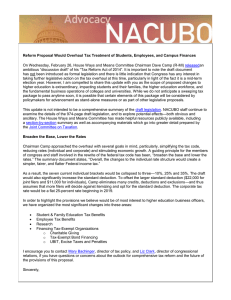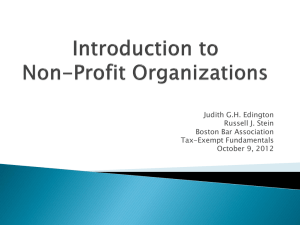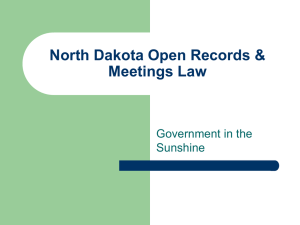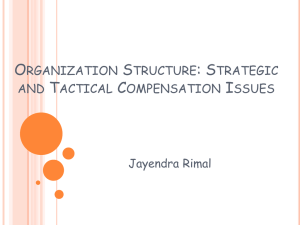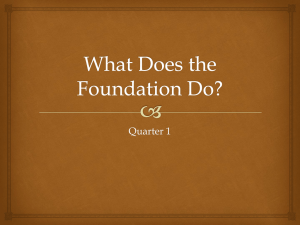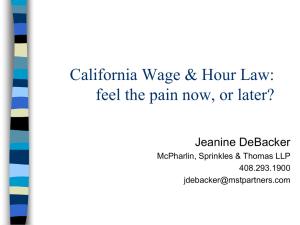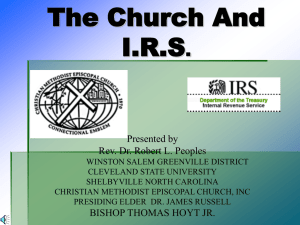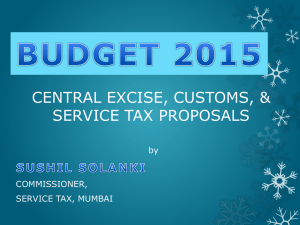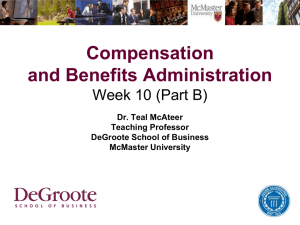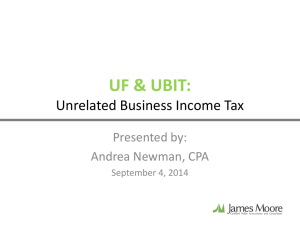the Tax Update Presentation
advertisement
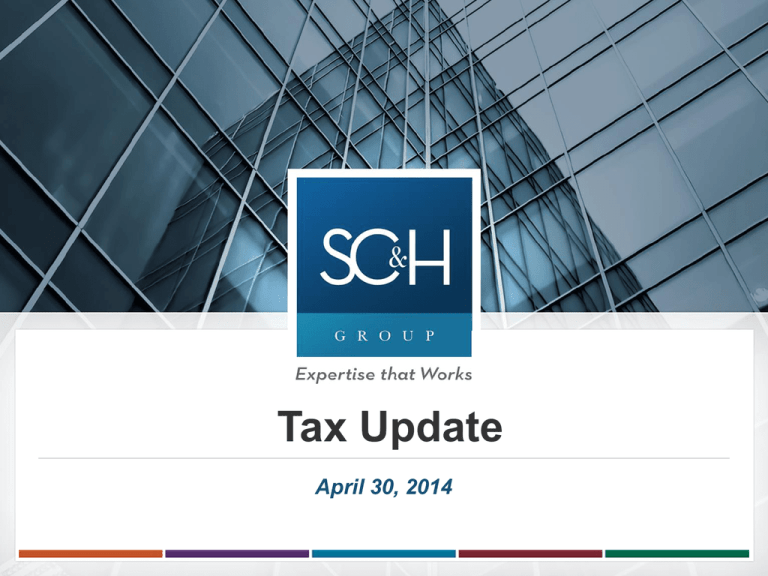
Tax Update April 30, 2014 SC&H Group Agenda Update from the IRS Expired Tax Provisions Impacting Exempt Organizations Proposed Legislation Impacting Tax Exempt Organizations Changes to the 2013 Form 990 2 Update From the IRS News from the IRS April 2013 results of College and University study that began in 2008 issued College and University study focused on unrelated business income and compensation Then head of EO, Lois Lerner, discusses UBIT study as part of priority plan Congressional review of EO with delay of processing of exempt applications Significant employee changes at highest levels of EO 4 News from the IRS As a result of Congressional review and significant changes with the highest levels of EO ▫ No F/Y 2013 annual report published ▫ No F/Y 2014 work plan published New Director of EO appointed – Tamera Ripperda – focus on process and transparency – reduction in waiting time for approval of tax exempt organization applications 5 News from the IRS Simplified procedures for retroactively reinstating taxexempt status of organizations that had status automatically revoked for failure to file (Rev. Proc. 2014-11) Tax-exempt organizations not required to file Form 8621 for PFIC investments (Notice 2014-28) 6 On the Horizon from the IRS Simplified Form 1023EZ application for smaller organizations Results of UBIT study Final §501(r)regulations on additional requirements that taxexempt hospitals must satisfy to remain tax-exempt 7 Currently Expired Tax Provisions Impacting Exempt Organizations – Expired 12/31/13 Tax-free distributions from individual retirement accounts (IRAs) for charitable purposes Extension of modification of tax treatment of certain payments to controlling exempt organizations (rent, interest, royalties…) Deduction for contributions of capital gain real property made for conservation purposes Tax deduction for contributions of food inventory by taxpayers other than C corporations Basis adjustment rule for stock of an S corporation making charitable contributions of property 8 Capital Hill Update: Camp Tax Reform Proposal Camp Tax Reform Proposal Total Revenue Raised from Tax Reform Provisions From Exempt Organization Proposals Combined $12 Billion Reform Accelerated Cost Recovery System $269.5 Billion Amortize Research and Development $192.6 Billion Treatment of Deferred Foreign Income $170.4 Billion Amortize Advertising Expenses $169.0 Billion Reform Subpart F $115.6 Billion Financial Institution Excise Tax $86.4 Billion Repeal LIFO Accounting Method $79.1 Billion Repeal Like Kind Exchanges $40.9 Billion Limit Cash Method Accounting $23.6 Billion Make Research Credit Permanent ($34.1) Billion 10 UBIT Loss Basketing Net UBTI calculated separately on each unrelated trade or business Losses from one business may only be used to offset income from that same business 11 Unrelated Business Income - Definition Unrelated business income is 1 - A trade or business for the production of income 2 - Regularly carried on; and 3 - Not substantially related to the organization’s exempt purpose 12 Exclusions from Unrelated Business Income Internal Revenue Code Sections 512-514 Investment Income – interest, dividends, annuities Royalties Real property rents (not debt-financed, exceptions for schools) Capital gains Certain research by colleges, universities, hospitals Qualified convention and trade show activities Qualified sponsorship payments 13 Royalties from Name/Logo License Tax royalties from sale/license of organization’s name or logo (including trademarks and copyrights) as UBTI per se “Many organizations, such as AARP, are now earning significant profits licensing their own names to for-profit businesses (which is not taxable to an exempt organization) to avoid engaging in an active trade or business themselves.” 14 Corporate Sponsorship Proposal to treat corporate sponsorship payments as UBTI if the sponsor acknowledgement refers to sponsor’s product lines. Proposal to treat exclusive sponsorship of large events (>$25,000) as UBTI - a sponsor’s name and logo may not be treated more favorable that others at such events) 15 College Endowment Excise Tax Proposal to impose 1% excise tax on net investment income of private colleges and universities with more than $100,000 of assets per full-time student (other than assets used directly in exempt activities). 16 High Compensation Excess Tax Proposal to impose a 25% excess tax on compensation in excess of $1 million • Tax is to be paid by the exempt organization • Compensation on the top five highest paid employees • Includes deferred compensation and parachute payments 17 Compensation/Excess Benefit Transactions Proposal that disqualified persons may no longer rely on compensation consultants to avoid excess benefit transaction excise tax. Proposal imposes a 10% excise tax on organizations participating in excess benefit transactions • May avoid the tax by following the rebuttable presumption procedure Proposal treats athletic coaches and investment advisors as disqualified persons Expands intermediate sanctions to IRC §501(c)(5) and §501(c)(6) organizations 18 Tax-Exempt Bonds Proposal would repeal the exception for tax-exempt status for qualified private activity bonds on a prospective basis - IRC§501(c)(3) bonds could no longer be issued on a tax-exempt basis Would eliminate advance refunding bonds (issuing tax-exempt bonds to refinance outstanding bonds) 19 Supporting Organizations Proposal to eliminate Type II and Type III Supporting Organizations Only Supporting Organizations that are “operated, supervised, or controlled by a publicly supported organization would qualify. 20 Donor-Advised Fund Distributions Proposal would require donor-advised funds to distribute contributions within five years of receipt Failure to distribute results in an excise tax of 20% of the undistributed amount 21 Charitable Deduction Modifications Charitable contributions made after close of tax year deductible until April 15th Charitable contributions deductible only to the extent that they exceed 2% of AGI Percentage limitations for gifts of cash and property to public charities reduced from 50% to 40%; gifts to private foundations reduced from 30% to 25% Value of deduction generally limited to adjusted basis Conservation easement incentive made permanent No deduction for land to be used for golf courses 22 Private Foundation Provisions Proposal to reduce excise tax on private foundation net investment income to 1% and repeal exemption exception for exempt operating foundations Proposal to repeal exemption to the 5% minimum distribution requirement for exempt operating foundations Proposal to impose 2.5% excise tax on private foundations that engage in a self-dealing transaction, 10% when it involves compensation- also eliminates safe harbor for reliance on professional advice 23 Form 990 Penalties Proposal to double the penalties related to Form 990 • Late of incomplete Form 990 – for larger orgs. from $100/day to $200/day, for smaller orgs. From $20/day to $40/day • Manager penalty – from $10/day to $20/day • Public inspection of returns -$100 to $200 • Tax Shelter disclosure - $100 to $200 Proposal to impose 5% accuracy penalty (cap at $40,000) on managers with respect to Form 990-T 24 Other Provisions Impacting Exempt Organizations Impose UBIT on income from fundamental research that is not made publicly available Increase UBTI deduction from $1,000 to $10,000 Mandatory electronic filing of Form 990 Repeal tax exemption for health insurance co-ops created under the Affordable Care Act Repeal tax exemption for property/casualty insurance companies Partner charitable contributions limited by outside basis Repeal tax-exempt status for professional sports leagues 25 Proposed Legislations – Public Good IRA Rollover Act of 2013 Remove the 100,000 cap on gifts from IRA accounts Lower the age threshold from age 70 1/2 to age 59 1/2 Make the IRA charitable distribution permanent Allow distributions to all public charities and private foundations 26 Changes to the 2013 Form 990 Part I – Summary Instructions clarify that professional fundraising fees must be reported, regardless of whether or not the recipient is an employee (in some cases the amount in Part I, line 16a will not agree to the amount in Part IX, Column D, line 25). 28 Part IV – Checklist of Required Schedules Line 2 instructions clarify that certain organizations must complete a public support test computation in Schedule A if excluding Schedule B contributors based on the $5,000/2% threshold, even if the organization would not otherwise have a public support test requirement. 29 Part VI – Governance, Management and Disclosure Line1b instructions clarify that for purposes of determining independence, compensation includes any amounts received during an organization’s tax year, even if no compensation is reportable on Part VII. Line 3 instructions clarify that compensation from a management company for management duties provided to the filing organization during that tax year must be listed in Schedule O. Line 15 instructions clarify that a “Yes” answer only applies if the filing organization (not a related organization) used a process for determining executive compensation that met the rebuttable presumption of reasonable. If the organization did not compensate the CEO, executive director or top management office during the tax year, the answer to question 15a is “no”. If the organization did not compensate any of its other officers, even if such employees were compensated by a related organization, answer “no” to line 15b. 30 Part VII, Statement of Revenue/Glossary Line 1 instructions clarify that discounts on services cannot be reported as contributions Glossary clarifies that “contributions” include neither donations or services nor discounts provided on sales of goods in the ordinary course of business Glossary clarifies for purposes of Form 990, disregarded entities are not “controlled entities” 31 Schedule A Instructions Added instructions to classify Type III supporting organizations as either “functionally integrated” or “nonfunctionally integrated” Implements payout requirements for non-functionally integrated Type III supporting organizations Under transitional rules, the classifications and payout requirements will generally apply to the 2014 tax year. 32 Schedule D Requirement for program-related investments to be categorized as either loans or equity investments in Part VIII Indentify and disclose in Part VIII any domestic organizations in which the organization has made program-related investments Requirement to explain in Part XIII credit counseling, debt management, credit repair, or debt negotiation services provided by the organization 33 Schedule F Clarifies that grants made to “domestic” persons that are “designated” for “foreign” beneficiaries should be reported on Schedule F rather than Schedule I Clarifies that investments in foreign-domiciled entities that are traded on a U.S. stock exchange do not require reporting 34 Schedule H For each hospital facility, the state license number must be provided Now required to provide the URL for a CHNA that is posted to a website Clarifies that self-pay and prompt-pay discounts do not constitute financial assistance policies Clarifies that contributions restricted by the organization to community benefit activities are reportable in Part I, Line 7i only if the restriction is in writing Direct offsetting revenue includes restricted grants and contributions used to provide a community benefit A clarification that the CHNA address the community’s “significant” health needs 35 Contact Information Lori Burghauser Principal lburghauser@scandh.com Visit: www.scandh.com Phone: (800) 921-8490 Email: sch_group@scandh.com 36
